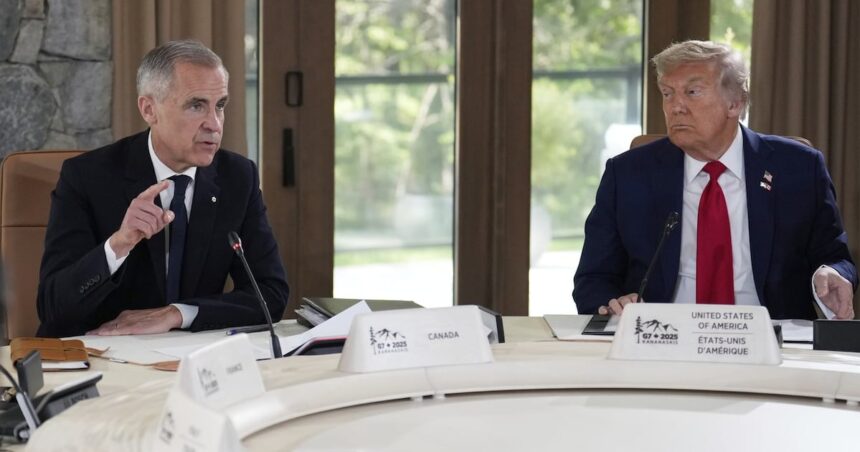Canada’s decision to shelve its controversial digital services tax marks a significant diplomatic pivot in the increasingly complex web of North American trade relations. After months of escalating tensions with the United States, Ottawa’s eleventh-hour reversal prevents what analysts warned could have triggered a damaging cycle of retaliatory tariffs between the longtime allies.
“This is what I’d call a mini-win for Canada in the bigger trade chessboard,” says Maryscott Greenwood, CEO of the Canadian American Business Council, speaking from her Washington office. “They’ve avoided immediate pain while maintaining leverage for future negotiations.”
The digital services tax, originally scheduled to take effect January 1, would have imposed a 3% levy on revenues earned by tech giants operating in Canada. The measure primarily targeted American technology behemoths like Google, Amazon, and Facebook, which Ottawa has long argued enjoy disproportionate profit from Canadian digital consumers while contributing minimally to the country’s tax base.
Finance Minister Chrystia Freeland announced the suspension yesterday following intense diplomatic engagement between Canadian and American trade representatives. “We remain committed to ensuring digital corporations pay their fair share,” Freeland stated, “but recognize the value of finding solutions through multilateral channels.”
The tax delay comes amid growing pressure from multiple fronts. The Office of the United States Trade Representative had explicitly warned that implementation would trigger countermeasures under Section 301 of the U.S. Trade Act – the same mechanism previously used to impose significant tariffs on Canadian aluminum and steel during the Trump administration.
Analysis from the C.D. Howe Institute estimated those potential retaliatory tariffs could have affected over $12 billion in Canadian exports, threatening more than 45,000 jobs across manufacturing and agricultural sectors already struggling with inflation and supply chain challenges.
For Canadian technology companies caught in the crossfire, the delay offers a temporary reprieve. “We’ve been watching this situation with serious concern,” explains Daniel Bernhard, executive director of the Digital Media Association of Canada. “While addressing digital tax fairness matters deeply to our members, having American tariffs imposed on unrelated Canadian industries would have been devastating to the broader economy.”
Behind the scenes, trade insiders suggest the suspension reflects Canada’s strategic calculation rather than abandonment of its position. By pausing implementation while continuing to advocate for a coordinated international approach through the OECD’s ongoing digital taxation framework, Ottawa maintains both diplomatic goodwill and policy flexibility.
This maneuver comes as the Canadian government faces mounting pressure to demonstrate trade competence amid economic headwinds. Recent data from Statistics Canada shows the country’s trade deficit widened to $3.1 billion in the last quarter, with cross-border commerce remaining a crucial economic lifeline.
The digital tax pause also reveals the lingering influence of Trump-era trade tactics on international economic relationships. “What we’re seeing is the shadow of previous confrontational approaches continuing to shape trade behavior,” observes Cristina Soreanu, senior fellow at the Centre for International Governance Innovation in Waterloo, Ontario.
For ordinary Canadians, the implications extend beyond abstract policy debates. Retail analyst Patricia Goff notes, “Any significant disruption to Canada-U.S. trade inevitably impacts consumer prices, particularly for seasonal produce and manufactured goods, which would have compounded current cost-of-living pressures facing households.”
The digital tax controversy underscores a fundamental tension in modern trade governance – how nations can effectively tax digital economic activity that defies traditional territorial boundaries. Canada joins France, the UK, and several other countries that have either implemented or considered similar measures, only to face significant pushback from Washington.
Amid this global tax puzzle, American tech firms have maintained that unilateral digital taxes create a fragmented regulatory environment that undermines innovation. Industry representatives have consistently advocated for a standardized international approach rather than country-by-country taxation regimes.
For now, Canadian officials emphasize they haven’t abandoned the principle of digital taxation but rather the timing and approach. “We reserve our sovereign right to implement measures ensuring fair taxation,” Freeland added in her statement, signaling the issue remains active.
As trade negotiations continue into 2023, observers note this episode demonstrates both the interconnectedness of North American economies and the delicate balancing act smaller trading nations must perform when addressing taxation in the digital age. With global digital tax frameworks still evolving at the OECD, Canada’s temporary retreat may ultimately prove more strategic pause than policy surrender.






